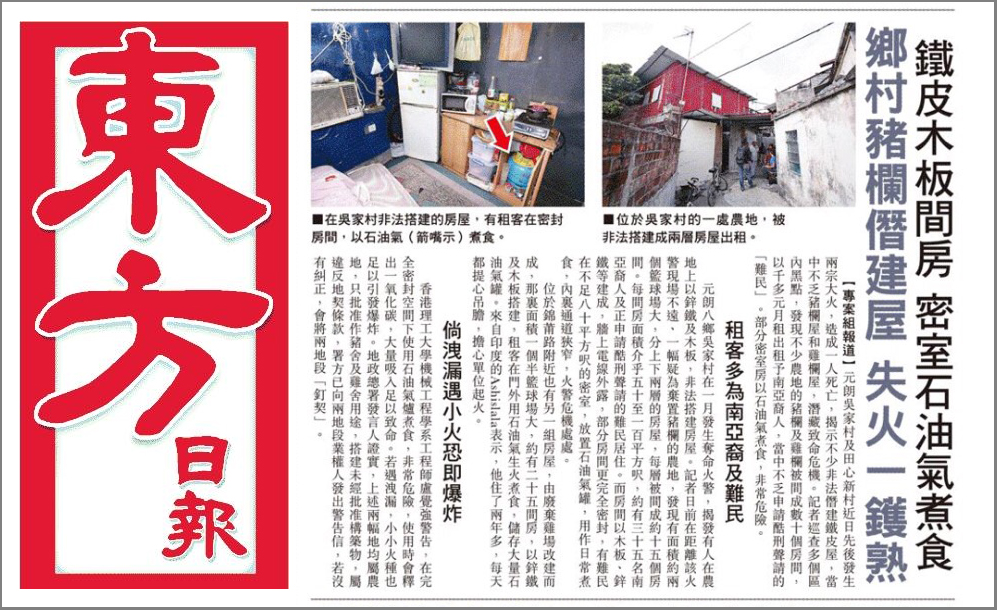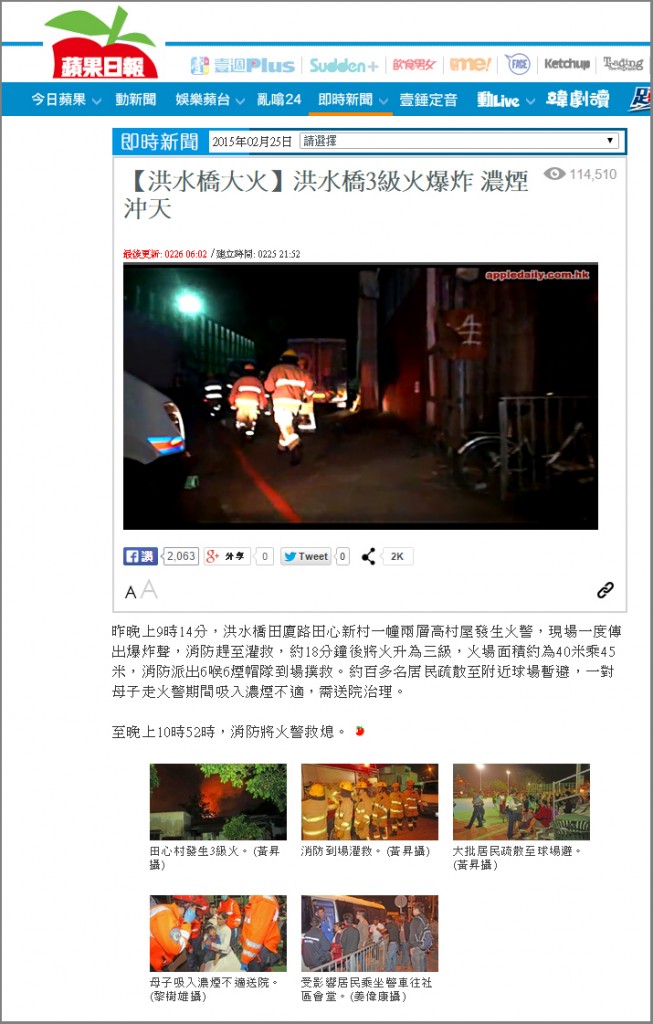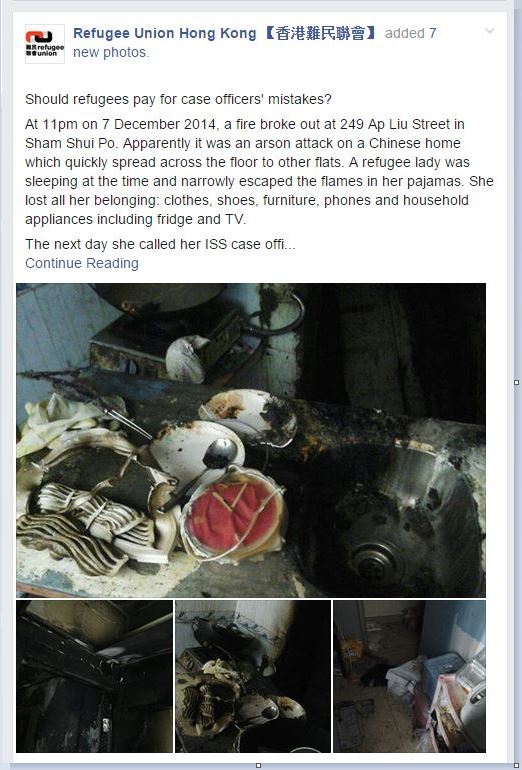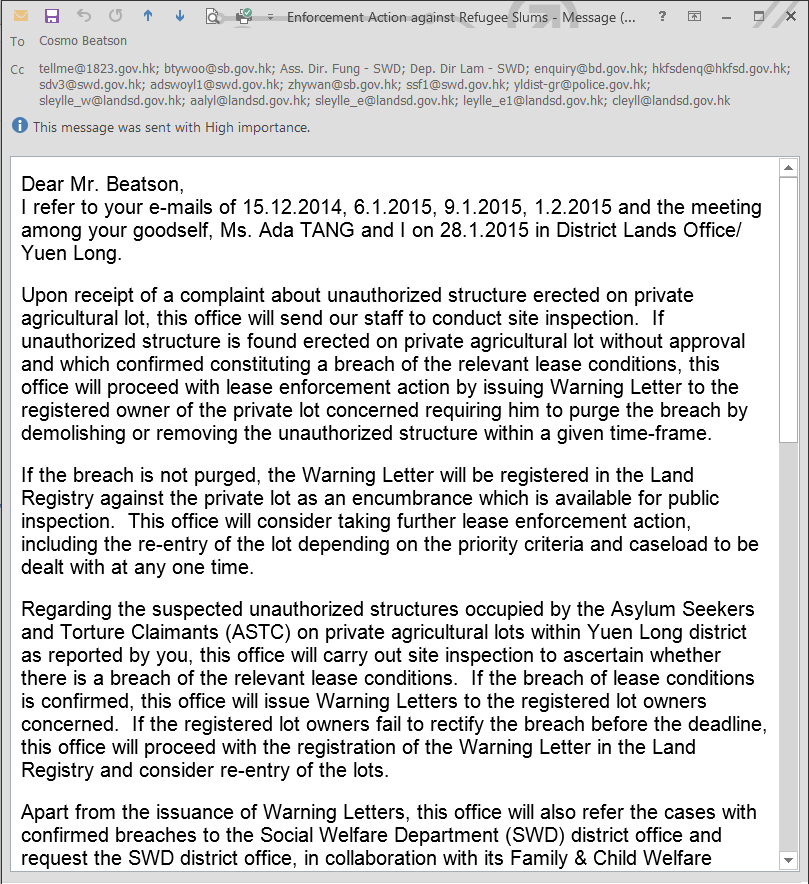“Oriental Daily” on Lands Department failures
Mar 1st, 2015 | Housing, Legal, Media, Welfare | Comment
Apple Daily on the fire in a refugee slum on 25 Feb 2015
Feb 28th, 2015 | Housing, Media, Welfare | Comment
Should refugees pay for case officers’ mistakes?
Feb 28th, 2015 | Crime, Housing, Personal Experiences, Refugee Community, Welfare | Comment
Blaze incinerates a refugee slum favored by ISS-HK
Feb 27th, 2015 | Crime, Housing, Personal Experiences, Welfare | Comment
Nobody was prepared to witness the devastation wrought by last night blaze on “The slum with the rusty gate” which Vision First brought to the attention of the authorities in October 2013 for reasons including a considerable fire hazard. In 2015 acts of God seem arranged to shut down refugee slums which (un)concerned government departments have been reluctant to dismantle.
Walking over the soaked remains of incinerated shacks which offered no sprinklers, fire extinguishers or fire hydrants (fire services laid hoses for trucks several hundred meters away), refugees observed it was a miracle nobody had died. “If the fire happened two hours later when everyone was asleep and the doors were locked, something worse would have happened for sure” noted Mumtaz, whose wife dashed out with their 2.5 month-old daughter, without a chance to grab her purse.
Burned remains, perforated tin sheets and bent metal beams reveal a conflagration that a crew of 165 firefighters with 35 fire engines could not contained till every shacks had been consumed by the raging fire. Eight fire trucks were dispatched to the nearest access road several hundred meters from Lot 2153 in Demarcation District 124, where ISS-HK currently sheltered 7 refugees, including children and a pregnant woman.
Unconfirmed reports indicate that the fire might have started in Francesca’s hut, constructed in a pigsty with metal sheets, plywood and no brick walls for sturdiness and protection. The hut was cluttered with a jumble salvaged from dumps, typical of refugee who scavenge to obtain everything they need. Francesca was known to cook on an electric stove, rumoured to have started the fire, which she brought home from a rubbish dump with no functionality assurance.
Ms. Mumtaz describes her escape, “I was cleaning the house and the door was open. I heard two loud bang noises. I looked and saw [Francesca’s] hut was burning very bad. We use cooking gas [large 27Kg. cylinders] and I was very scared of explosions. I was so afraid …. I grabbed the baby and ran away in my nightgown. I didn’t have time to take my other documents, just the her birth certificate.”
Yusna lives in a nearby refugee slum, “This is the third time I see fire like this. Every night I sleep with my daughter and I am afraid. Two years ago it happened in Hung Shui Kiu and ISS moved me to another slum. Then there was another fire and I moved here. But we are not safe like this. These houses burn very very fast. There is no way but run away.”
Arif of the Refugee Union commented, “It is the second fire in ISS slums in one month. They are lucky nobody died last night. God is telling them that the slums are dangerous and next time there will be dead people. These refugees lost everything: clothes, furniture, appliances, nothing left. It takes a family more than a year to collect everything they need from garbage. What can they do now?”
Mr. Mumtaz lived in this slum for 3.5 years with rent paid by ISS-HK from the government purse to a purported landlord. The address displayed on his ISS-HK Agreement on Provision of Assistance signed on 12 February 2015 is: Rm B3, No. 12 Tin Sum Sun Tsuen, Yuen Long.
There is a minor variation from the address shown in hisISS-HK Agreement signed on 13 September 2013. It is significant that the Lands Department officially identifies this location as Lot 2153 in Demarcation District 124 in Tin Sam San Tsuen. What justifies the considerable discrepancy?
Fire burns through a refugee slum, again
Feb 26th, 2015 | Crime, Housing, Refugee Community, Welfare | Comment
On 25 February 2015 at 10:30pm alarming SMS circulated, “Good evening, I want to give information. There is fire in the Chung Uk Tsuen [slums] near the home of Yusna. Precisely in the house of Refugee Union Francesca … two houses burnt to a crisp … She was rushed to the hospital because she was limp and panic.”
A month after a fire took the life of Sri Lankan refugee Lucky, another blaze raged through a compound near Tuen Mun, in an area with the highest concentration of refugee slums supported by ISS-HK with government funds. An intricate maze of narrow paths intersect agricultural lots where rusty, ramshackle ruins of pigsties and chicken sheds are turned into illegal dwellings.
It is reported that a gas cylinder blew up in the shack of a resident Pakistani, starting a blaze that engulfed the compound familiar to Vision First as “The slum with the rusty gate”, reported on 4 October 2013. At the time we noted that residents lived in and maintained better abodes than penniless refugees who cannot afford repairs and whose ISS-HK contracts displayed fake addresses.
Police cordoned off the area to facilitate the work of dozens of firemen and medics who worked frantically till 2pm. Preliminary information indicates that the blaze broke out shortly after 9pm and took almost four hours to extinguish presumably due to a lack of fire hydrants and vehicular access, combined with challenging nighttime conditions.
Assuming that all slum dwellers escaped unscathed, the complex erection of several shacks on two storeys and the unregulated storage of gas cylinders probably increased the danger faced by rescuers. This blaze didn’t only threaten the life and property of refugees, but also of residents who apparently don’t enjoy the building standards and fire safety regulations which ought to protect everyone by law.
Vision First is concerned about Francesca and her two year-old son Ismaeel who lived in one of the huts reported to have burned to ashes. In 2010 Francesca fled to Hong Kong with a well-founded fear for her life. She was not a domestic worker. The awful living conditions she endured in the slum bore witness to the severity of the domestic violence that compelled her to leave five children behind.
Last night Francesca was taken by ambulance to hospital in a state of shock. She often complained about her dangerous hut, but had no money to relocate. Her home flooded in the rain, backed in the sun and seemed poised to collapse under its own weight. Hers was one of the worst shacks documented and a crying shame for caseworkers who permitted a mother and baby to live there.
An act of God draws attention again to the slums where indigent people – in this case residents and refugees – live in hazard conditions that the authorities chose to ignore despite their very existing challenging rules and regulations. An activist observed, “The rule of law is bent. But since no one complaints, it is fine. Let business go unimpeded, since business is all that matters in Hong Kong.”
RU proposes caseworkers sign leases
Feb 24th, 2015 | Housing, Refugee Community, Welfare | Comment
The Refugee Union floated a new idea as reported by a recent post on Facebook. The SWD or ISS-HK should sign the lease agreements with landlords to house refugees. The proposal makes perfect sense because refugees:
- Are entirely and passively dependent on welfare;
- Did not determine the rent assistance of 1500$;
- Have no savings or income to handle economic transactions;
- Are prohibited from working under threat of 15-22 months jail;
- Have no bargaining power with landlords and agents.
The Hong Kong Government ensures that refugees suffer destitution with the aim of avoiding the creation of a ‘magnet effect’ that would encourage others to seek asylum in the city. As such, the authorities are responsible for their lodging, food, clothing and medical services of this group.
Given that refugees often scramble for cash to purchase necessities such as cooking gas and shoes, it is unreasonable to expect penniless people to sign a 12 to 24 month tenancy agreement for residences that, in today’s market, typically cost more than 2500$ when assisted with only 1500$.
No wonder estate agents and landlords are loath to rent properties to refugees. Property owners expect to be paid rent monthly and don’t appreciate chasing tenants for payments which might be indefinitely delayed due to lack of income. Who in his right mind would rent his property to an unemployed individual who has no savings and work rights?
By deciding that refugees should not work, the government denied the entire group participation in solving the problems relating to their livelihood. By doing so, the authorities effectively reduced them to ‘children of the state’, who can do nothing more than beg from charities and well-wishers. If that is the nature of seeking asylum in Hong Kong, then refugees are 100% dependent on the state.
There are other advantages to having caseworkers secure and sign lease agreements. First, they would experience the stress of flat hunting with a laughable 1500$ budget. Second, they would appreciate negotiations with wary agents and landlords unsure who will foot the bill. Third, they might become advocates for a better housing policy as they clash against the inadequacy of current arrangements.
It seems that refugees have had enough of the housing games and want caseworkers to handle the impossible task of renting rooms for a 1500$ budget and dealing with the complications that arise from forced cohabitation when several individuals share a tiny room. The question is how will refugees compel caseworkers to step into this minefield?
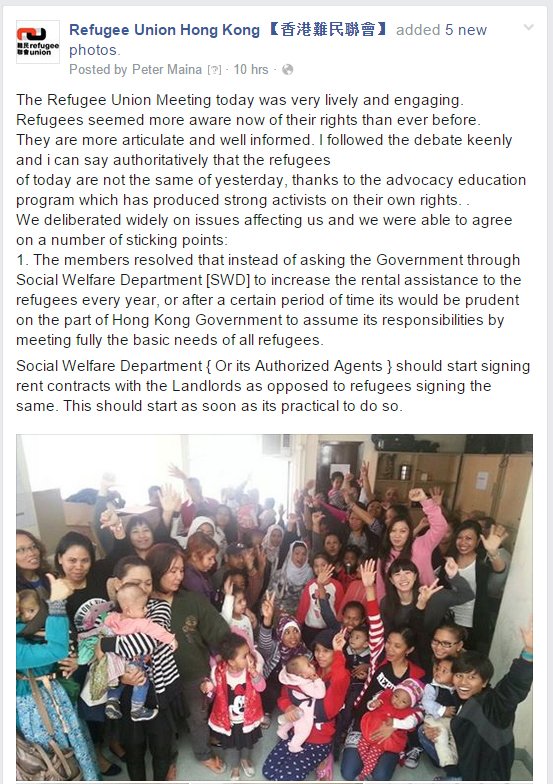
Homeless refugees demand proper housing
Feb 18th, 2015 | Housing, Refugee Community, Welfare | Comment
On 17 February 2015, a group of 60 refugees protested at the Social Welfare Department head-office with yet another chorus of complaints to demand greater scrutiny of the current housing crisis that followed the clampdown on refugee slums.
For the third time in a month refugees evicted from illegal huts and shacks made it clear to SWD officials that they are boxed in on four sides:
- They are not allowed to work and are jailed 15 to 22 months upon conviction;
- The 1500$ rent assistance is wholly insufficient in the current housing market;
- Land authorities demand the purging of slums triggering mass evictions;
- Guesthouse rooms are no longer offered as an alternative to homeless refugees.
Pressured by slum lords to leave and unable to secure cheap rooms, 21 refugees represented a hundred colleagues in the slums of Yuen Long and Kam Tin and demanded an urgent and lasting solution to housing needs. They were joined by several homeless refugees from Kowloon and supported by refugee activists and Vision First to lodge formal complaints with SWD social workers.
However, when told that grievances would be referred back to ISS-HK caseworkers, the protesters became agitated. Refugees accused SWD and its contractor of shifting them around, telling refugees in Yuen Long there were rooms in Kam Tin and vice-versa, when inhabitants from both areas sat side-by-side and were familiar with housing prices and shortage.
It was reported that ISS-HK had raised justifications with SWD by accusing the affected refugees of being ‘uncooperative and refusing to accept offers’. But refugees demanded that caseworkers bring such offers to SWD HQ and explain location, occupancy and rental, on top of the legality of certain arrangements. SWD replied that it wasn’t necessary for ISS-HK to bring over the ‘master list’.
It is worth noting that the one refugee who could have died in the blaze that killed Lucky, was lodged by ISS-HK in a guesthouse the next day and not asked to leave. However his colleagues from the same slum, whose huts did not go up in flames, had their rent stopped and faced eviction. Does this point to a government policy to offer guesthouse rooms only to refugees who had a near death experience?
To great consternation and frantic activity in the SWD head-office, the stand-off continued till evening. The press arrived followed by the police. After failing to mediate and suggesting that ISS-HK join the negotiations, the police noted that the protest was peaceful and there was nothing more they could do, so they left. The protesters were preparing to start an occupation and considered options.
Then a senior SWD officer unofficially agreed that the guesthouse solution would not be scrapped, but kept as one option in the protocol in the winding down of slums. An adjustment period is necessary for refugees accustomed to spacious yet dangerous and illegal slum rooms, to transition to multiple-occupancy in apartments. A degree of flexibility and respect is owed to slum-dwellers who were neglected for years in dangerous slums and suddenly evicted.
Further it was accepted that traumatized refugees, and those with medical conditions, should not be threatened with eviction when they fail to secure 1500$ rooms, or refuse to share with strangers, until lasting solutions are identified.
It is hoped that this wave of protest brought home to officials that genuine ‘case by case assessment’ does not equate with stopping rent to force vulnerable refugees overnight into shabby dormitories. This might be unavoidable when rescuing 2000 migrants in one day, but it is unpalatable for veteran refugees such as these protesters who have called Hong Kong home for 5 to 10 years. The guesthouse solution should remain available until suitable flats are secured, least homeless refugees take to the streets again in greater number.


